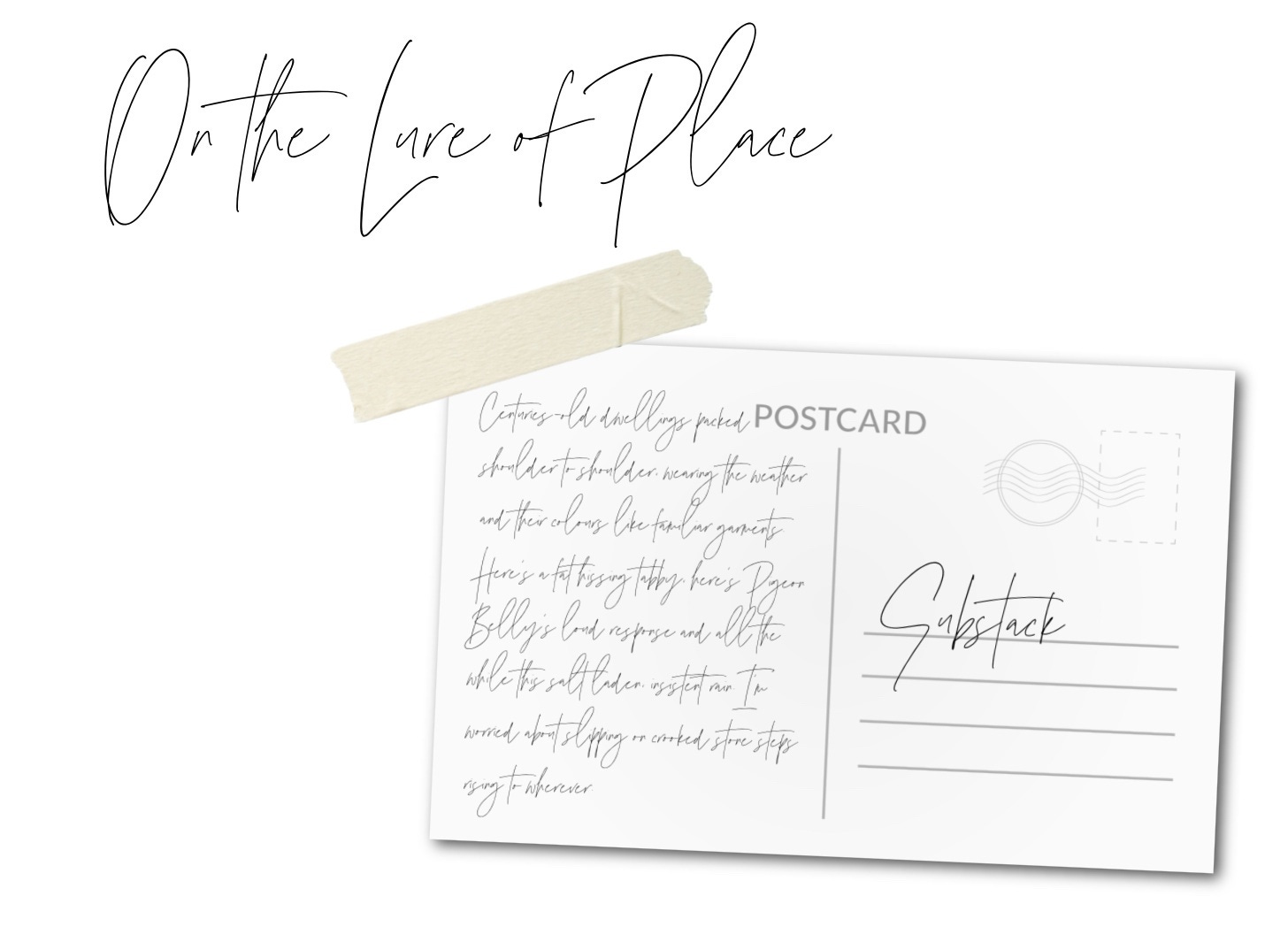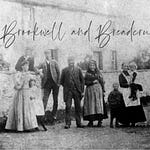A morning in October, the day after I turned sixty. But I’m like that six-year-old who wakes early to see the sea. We’d arrived the night before in darkness, had been on the road eleven hours with stops.
It’s barely light when we leave the holiday cottage. Pigeon Belly pulls me through the narrow street up the hill. Centuries-old dwellings packed shoulder to shoulder, wearing the weather and their colours like familiar garments. Here’s a fat hissing tabby, here’s Pigeon Belly’s loud response and all the while this salt laden, insistent rain. I’m worried about slipping on crooked stone steps rising to wherever; have I got enough dog poo bags, and where are the bins?
I hadn’t meant to fall in love - wasn’t that what I’d warned myself against? Yet here it is, profound, tearful, strange; and rising like groundwater through the cracks of ordinary experience: recognition. Home. I feel at home here in Mevagissey - despite this rain and holding Pigeon Belly’s lead while he tugs me with one hand (the other busy with the unglamorous rituals of dog ownership.) These very interruptions have created the conditions for truth to slip in unannounced.
We speak often of place-attachment as something cultivated, grown carefully like a garden from seeds of intention. But sometimes it arrives like a remembered language - not learned but recalled from some deeper current of being. But this morning, really? I’m not seeking significance, am I? Is that why it has found me?
And now we’re back in the cottage, and I’m sitting at the table writing this. I can hear one-hundred gulls and a million pins of rain on the windows, M stirring from sleep, Pigeon Belly washing his leg. There won’t be much time to write this week, we’re waiting for dear friends to arrive. They’ve made the journey south from Cumbria too, but had to stop overnight in Bristol.
“Some things we have only as long as they remain lost, some things are not lost only so long as they are distant.” Rebecca Solnit
Back in Cumbria I’ve been gathering stories like rainfall - each droplet a memory, a voice, a shadow moving across stone walls. This documentation, this conscious preservation of place, has become its own kind of meditation. I’ve brought Rebecca Solnit’s A Field Guide to Getting Lost to Cornwall. There’s a passage I keep returning to: “Some things we have only as long as they remain lost, some things are not lost only so long as they are distant.” Sitting here this morning, something clicks. Perhaps it’s the very act of making a village archive in Cumbria, of documenting its essence in words, recordings, photographs, that has created space for this other knowing to surface. As if the conscious work of preservation has loosened something deeper, like how a tide withdraws revealing hidden pools among rocks.
In the language of recovery and therapy, we speak of ‘pulling a geographic’ - that belief that a change of place might transmute into a change of self. I know this narrative well. I’ve seen how external movement often masks internal restlessness, like waves mistaking their own motion for progress while deeper currents remain unchanged. (I know, I know, here I go again, anthropomorphizing waves.) So I hold these feelings with care. I’ve never done a fire walk, but I imagine the embers now. They’re warm with potential, yet capable of scorching if I linger too long, testing whether this is escape or recognition, running from or walking toward.
Pigeon Belly puts his paws on the window ledge, looks out, looks at me. When are we going out again? But I head out alone to buy breakfast pastries for M and me.
… And take a detour past an estate agent’s window.
All that week in Cornwall I gathered what I could, with notebook and pen, my diary, voice notes, photos, and in reading and conversations. I collected snippets: harbourside conversations, the rhythm of tide times, the names of boats that sound like poetry. I learned which shops have been in the same family forever.
I’d met an artist whose family story stretches back through almost eight centuries of Cornwall. She mentioned this not as a boast but as a simple fact, like noting the weather. I’d tried to grasp the depth of this belonging. Each generation had added their own layer to her family’s understanding of place. It was like the steady accumulation of shells that one day become limestone. Mevagissey wasn’t history preserved behind glass. In the village, people are place. It’s about history lived and breathed, passed down through embodied knowledge. This kind of deep-rooted connection to place feels almost mythical in our age of easy mobility. Yet here it persists, not as quaint relics but as necessary as the tide charts that govern each day. The artist’s family presence spans from medieval fishing boats to modern trawlers. Each generation adds its own verse to a long conversation.
These aren’t stories that make it into guidebooks or estate agent windows. But these are the textures that make up a place’s true character. There was a shopkeeper who kept spare keys for half the street. The locals knew which boats would return at which tide. Day by day, these accumulated details wrote themselves into my understanding, not as tourist curiosities but as the living grammar of place. Each conversation, each observed ritual, each overheard snippet of local knowledge added another layer to that first morning’s recognition.
One evening I'd read something that hit home. It was from Jade Angeles Fitton's memoir Hermit: "We even look at pricey Dorset out of desperation – nothing." She was right. M and I grew up in Dorset, our hearts still hold its commons, chalk downs and Jurassic coast dear. But because it's close to London, places we once knew well - Corfe Castle, Lulworth Cove and Studland - have become weekend getaways for city people. Even a studio flat in our home county would cost too much for us now. Meva feels different. Here in the village and in other working harbours there are still modest cottages by the water that normal people like us might afford.
There’s other things I thought about that week. Inland, Cornwall feels a lot like West Cumbria. Both places are proper, not prettied up for show. I’ll write more about this in time.
Each working harbour in Cornwall holds its own grammar of belonging but shares streets and paths worn smooth by generations of footsteps. Time moves in multiple currents, the immediate pulse of tide and weather, boats departing and returning. Then there are slower streams, how certain families have knowledge of local waters passed down like heirlooms. Many places have turned their history into a commodity - Bath, Edinburgh, St Ives, Padstow, York. But Mevagissey maintains a strong keep it real relationship with its past. Here, the dialogue with the sea isn’t performance. It’s living necessity, as old as salt and stone.
Mevagissey is the Cornwall of holiday brochures, but, like Newlyn, say, Mevagissey keeps it real. The community are friendly, if you’re looking for a forever home and not a second home, especially. And, just like in the Cumbrian village where we live, there are generation upon generation of local families, and folk who live there from far, far away.
You can’t make yourself belong just by wanting to. It happens slowly as you get to know a place, its daily patterns, its habits, the way it lives with the sea and weather. Yet sometimes recognition arrives first, like it did for me that rain-soaked morning with Pigeon Belly pulling at his lead. Perhaps that sudden knowing was just the tide turning. Since then, each conversation overheard, each boat name learned, each nod from a local has been like those shells slowly becoming limestone - layer upon layer of small moments building something solid enough to stand on. The village speaks in a language my heart somehow already knew, even as my mind is still learning its grammar.










Share this post